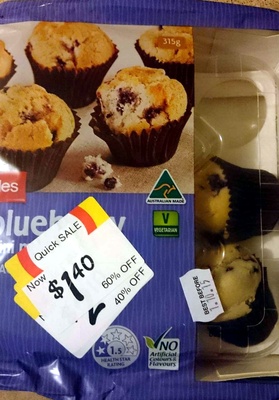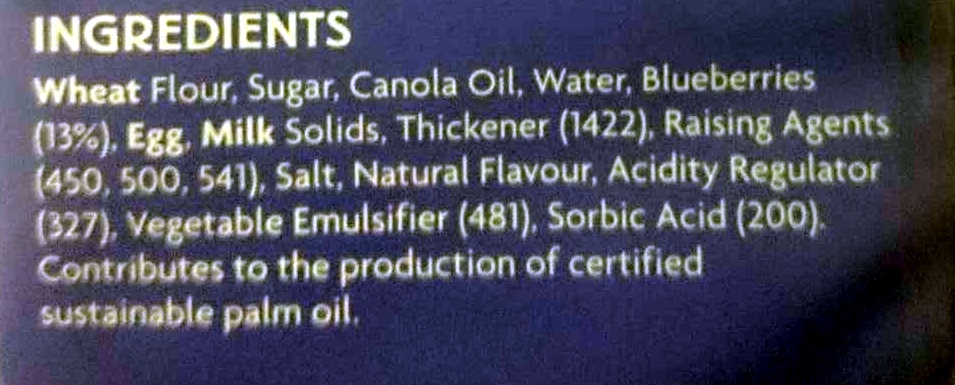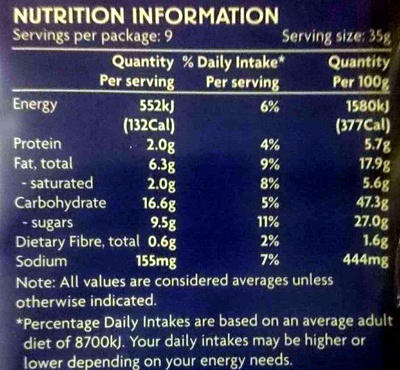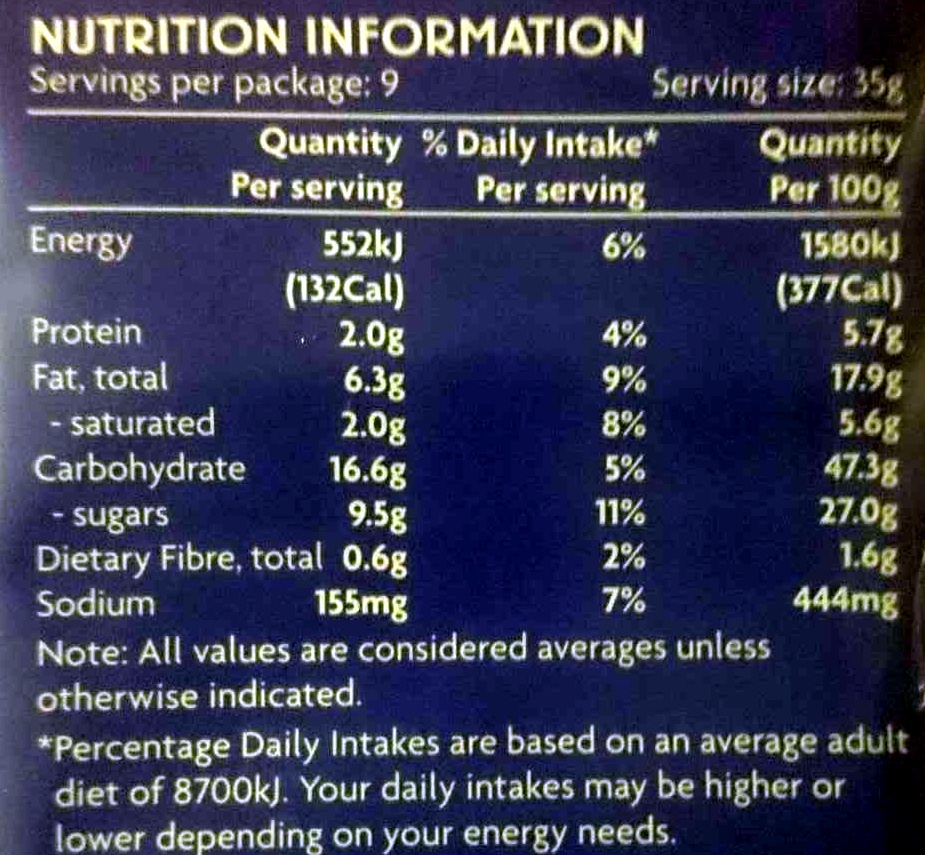Help us make food transparency the norm!
As a non-profit organization, we depend on your donations to continue informing consumers around the world about what they eat.
The food revolution starts with you!
Blueberry Muffins - Coles - 9 pack 375g
Blueberry Muffins - Coles - 9 pack 375g
This product page is not complete. You can help to complete it by editing it and adding more data from the photos we have, or by taking more photos using the app for Android or iPhone/iPad. Thank you!
×
Barcode: 9310645107219 (EAN / EAN-13)
Quantity: 9 pack 375g
Packaging: Plastic
Brands: Coles
Categories: Snacks, Desserts, Sweet snacks, Biscuits and cakes, Cakes, Muffins, Fruit muffins, Blueberry muffins
Labels, certifications, awards: Sustainable, Vegetarian, No artificial flavors, Sustainable Palm Oil, Australian made, No artificial colors, No artificial colours or flavours
Origin of ingredients: Australia, Imported unknown
Manufacturing or processing places: Australia
Link to the product page on the official site of the producer: http://shop.coles.com.au/online/national...
Stores: Coles
Countries where sold: Australia
Matching with your preferences
Health
Ingredients
-
20 ingredients
Wheat Flour, sugar, Canola Oil, Water, Blueberries (13%), Egg, Milk Solids, Thickener (1422), Raising Agents, (450,500,541) Salt, Natural Flavour, Acidity Regulator (327), Vegetable Emulsifier (481), Sorbic Acid (200). Contributes to the production of certified sustainable palm oil.Allergens: Eggs, Gluten
Food processing
-
Ultra processed foods
Elements that indicate the product is in the 4 - Ultra processed food and drink products group:
- Additive: E1422 - Acetylated distarch adipate
- Additive: E327 - Calcium lactate
- Additive: E450 - Diphosphates
- Additive: E481 - Sodium stearoyl-2-lactylate
- Ingredient: Flavouring
- Ingredient: Thickener
Food products are classified into 4 groups according to their degree of processing:
- Unprocessed or minimally processed foods
- Processed culinary ingredients
- Processed foods
- Ultra processed foods
The determination of the group is based on the category of the product and on the ingredients it contains.
Additives
-
E1422 - Acetylated distarch adipate
Acetylated distarch adipate: Acetylated distarch adipate -E1422-, is a starch that is treated with acetic anhydride and adipic acid anhydride to resist high temperatures. It is used in foods as a bulking agent, stabilizer and a thickener. No acceptable daily intake for human consumption has been determined.Source: Wikipedia
-
E200 - Sorbic acid
Sorbic acid: Sorbic acid, or 2‚4-hexadienoic acid, is a natural organic compound used as a food preservative. It has the chemical formula CH3-CH-4CO2H. It is a colourless solid that is slightly soluble in water and sublimes readily. It was first isolated from the unripe berries of the Sorbus aucuparia -rowan tree-, hence its name.Source: Wikipedia
-
E327 - Calcium lactate
Calcium lactate: Calcium lactate is a white crystalline salt with formula C6H10CaO6, consisting of two lactate anions H3C-CHOH-CO−2 for each calcium cation Ca2+. It forms several hydrates, the most common being the pentahydrate C6H10CaO6·5H2O. Calcium lactate is used in medicine, mainly to treat calcium deficiencies; and as a food additive with E number of E327. Some cheese crystals consist of calcium lactate.Source: Wikipedia
-
E450 - Diphosphates
Diphosphates (E450) are food additives often utilized to modify the texture of products, acting as leavening agents in baking and preventing the coagulation of canned food.
These salts can stabilize whipped cream and are also found in powdered products to maintain their flow properties. They are commonly present in baked goods, processed meats, and soft drinks.
Derived from phosphoric acid, they're part of our daily phosphate intake, which often surpasses recommended levels due to the prevalence of phosphates in processed foods and drinks.
Excessive phosphate consumption is linked to health issues, such as impaired kidney function and weakened bone health. Though diphosphates are generally regarded as safe when consumed within established acceptable daily intakes, it's imperative to monitor overall phosphate consumption to maintain optimal health.
-
E481 - Sodium stearoyl-2-lactylate
Sodium stearoyl lactylate: Sodium stearoyl-2-lactylate -sodium stearoyl lactylate or SSL- is a versatile, FDA approved food additive used to improve the mix tolerance and volume of processed foods. It is one type of a commercially available lactylate. SSL is non-toxic, biodegradable, and typically manufactured using biorenewable feedstocks. Because SSL is a safe and highly effective food additive, it is used in a wide variety of products ranging from baked goods and desserts to pet foods.As described by the Food Chemicals Codex 7th edition, SSL is a cream-colored powder or brittle solid. SSL is currently manufactured by the esterification of stearic acid with lactic acid and partially neutralized with either food-grade soda ash -sodium carbonate- or caustic soda -concentrated sodium hydroxide-. Commercial grade SSL is a mixture of sodium salts of stearoyl lactylic acids and minor proportions of other sodium salts of related acids. The HLB for SSL is 10-12. SSL is slightly hygroscopic, soluble in ethanol and in hot oil or fat, and dispersible in warm water. These properties are the reason that SSL is an excellent emulsifier for fat-in-water emulsions and can also function as a humectant.Source: Wikipedia
-
E500 - Sodium carbonates
Sodium carbonates (E500) are compounds commonly used in food preparation as leavening agents, helping baked goods rise by releasing carbon dioxide when they interact with acids.
Often found in baking soda, they regulate the pH of food, preventing it from becoming too acidic or too alkaline. In the culinary world, sodium carbonates can also enhance the texture and structure of foods, such as noodles, by modifying the gluten network.
Generally recognized as safe, sodium carbonates are non-toxic when consumed in typical amounts found in food.
Ingredients analysis
-
Palm oil content unknown
Unrecognized ingredients: 1422, 450-500-541, 327, Vegetable-emulsifier, 481, 200, Contributes-to-the-production-of-certified-sustainable-palm-oilSome ingredients could not be recognized.
We need your help!
You can help us recognize more ingredients and better analyze the list of ingredients for this product and others:
- Edit this product page to correct spelling mistakes in the ingredients list, and/or to remove ingredients in other languages and sentences that are not related to the ingredients.
- Add new entries, synonyms or translations to our multilingual lists of ingredients, ingredient processing methods, and labels.
If you would like to help, join the #ingredients channel on our Slack discussion space and/or learn about ingredients analysis on our wiki. Thank you!
-
Non-vegan
Non-vegan ingredients: Egg, Milk solidsSome ingredients could not be recognized.
We need your help!
You can help us recognize more ingredients and better analyze the list of ingredients for this product and others:
- Edit this product page to correct spelling mistakes in the ingredients list, and/or to remove ingredients in other languages and sentences that are not related to the ingredients.
- Add new entries, synonyms or translations to our multilingual lists of ingredients, ingredient processing methods, and labels.
If you would like to help, join the #ingredients channel on our Slack discussion space and/or learn about ingredients analysis on our wiki. Thank you!
-
Vegetarian
No non-vegetarian ingredients detected
Unrecognized ingredients: 1422, 450-500-541, 327, Vegetable-emulsifier, 481, 200, Contributes-to-the-production-of-certified-sustainable-palm-oilSome ingredients could not be recognized.
We need your help!
You can help us recognize more ingredients and better analyze the list of ingredients for this product and others:
- Edit this product page to correct spelling mistakes in the ingredients list, and/or to remove ingredients in other languages and sentences that are not related to the ingredients.
- Add new entries, synonyms or translations to our multilingual lists of ingredients, ingredient processing methods, and labels.
If you would like to help, join the #ingredients channel on our Slack discussion space and/or learn about ingredients analysis on our wiki. Thank you!
-
Details of the analysis of the ingredients
We need your help!
Some ingredients could not be recognized.
We need your help!
You can help us recognize more ingredients and better analyze the list of ingredients for this product and others:
- Edit this product page to correct spelling mistakes in the ingredients list, and/or to remove ingredients in other languages and sentences that are not related to the ingredients.
- Add new entries, synonyms or translations to our multilingual lists of ingredients, ingredient processing methods, and labels.
If you would like to help, join the #ingredients channel on our Slack discussion space and/or learn about ingredients analysis on our wiki. Thank you!
: Wheat Flour, sugar, Canola Oil, Water, Blueberries 13%, Egg, Milk Solids, Thickener (1422), Raising Agents (450‚500‚541), Salt, Natural Flavour, Acidity Regulator (327), Vegetable Emulsifier (481), Sorbic Acid (200), Contributes to the production of certified sustainable palm oil- Wheat Flour -> en:wheat-flour - vegan: yes - vegetarian: yes - ciqual_proxy_food_code: 9410 - percent_min: 13 - percent_max: 48
- sugar -> en:sugar - vegan: yes - vegetarian: yes - ciqual_proxy_food_code: 31016 - percent_min: 13 - percent_max: 27
- Canola Oil -> en:canola-oil - vegan: yes - vegetarian: yes - from_palm_oil: no - percent_min: 13 - percent_max: 24.6666666666667
- Water -> en:water - vegan: yes - vegetarian: yes - ciqual_food_code: 18066 - percent_min: 13 - percent_max: 21.75
- Blueberries -> en:blueberry - vegan: yes - vegetarian: yes - ciqual_food_code: 13028 - percent_min: 13 - percent: 13 - percent_max: 13
- Egg -> en:egg - vegan: no - vegetarian: yes - ciqual_food_code: 22000 - percent_min: 0 - percent_max: 12
- Milk Solids -> en:milk-solids - vegan: no - vegetarian: yes - ciqual_proxy_food_code: 19051 - percent_min: 0 - percent_max: 9.6
- Thickener -> en:thickener - percent_min: 0 - percent_max: 8
- 1422 -> en:1422 - percent_min: 0 - percent_max: 8
- Raising Agents -> en:raising-agent - percent_min: 0 - percent_max: 6.85714285714286
- 450‚500‚541 -> en:450-500-541 - percent_min: 0 - percent_max: 6.85714285714286
- Salt -> en:salt - vegan: yes - vegetarian: yes - ciqual_food_code: 11058 - percent_min: 0 - percent_max: 1.12776
- Natural Flavour -> en:natural-flavouring - vegan: maybe - vegetarian: maybe - percent_min: 0 - percent_max: 1.12776
- Acidity Regulator -> en:acidity-regulator - percent_min: 0 - percent_max: 1.12776
- 327 -> en:327 - percent_min: 0 - percent_max: 1.12776
- Vegetable Emulsifier -> en:vegetable-emulsifier - percent_min: 0 - percent_max: 1.12776
- 481 -> en:481 - percent_min: 0 - percent_max: 1.12776
- Sorbic Acid -> en:e200 - vegan: yes - vegetarian: yes - percent_min: 0 - percent_max: 1.12776
- 200 -> en:200 - percent_min: 0 - percent_max: 1.12776
- Contributes to the production of certified sustainable palm oil -> en:contributes-to-the-production-of-certified-sustainable-palm-oil - percent_min: 0 - percent_max: 1.12776
Nutrition
-
Poor nutritional quality
⚠ ️Warning: the amount of fruits, vegetables and nuts is not specified on the label, it was estimated from the list of ingredients: 31This product is not considered a beverage for the calculation of the Nutri-Score.
Positive points: 1
- Proteins: 3 / 5 (value: 5.7, rounded value: 5.7)
- Fiber: 1 / 5 (value: 1.6, rounded value: 1.6)
- Fruits, vegetables, nuts, and colza/walnut/olive oils: 0 / 5 (value: 31.8333333333333, rounded value: 31.8)
Negative points: 19
- Energy: 4 / 10 (value: 1580, rounded value: 1580)
- Sugars: 5 / 10 (value: 27, rounded value: 27)
- Saturated fat: 5 / 10 (value: 5.6, rounded value: 5.6)
- Sodium: 5 / 10 (value: 451.104, rounded value: 451.1)
The points for proteins are not counted because the negative points are greater or equal to 11.
Nutritional score: (19 - 1)
Nutri-Score:
-
Nutrient levels
-
Fat in moderate quantity (17.9%)
What you need to know- A high consumption of fat, especially saturated fats, can raise cholesterol, which increases the risk of heart diseases.
Recommendation: Limit the consumption of fat and saturated fat- Choose products with lower fat and saturated fat content.
-
Saturated fat in high quantity (5.6%)
What you need to know- A high consumption of fat, especially saturated fats, can raise cholesterol, which increases the risk of heart diseases.
Recommendation: Limit the consumption of fat and saturated fat- Choose products with lower fat and saturated fat content.
-
Sugars in high quantity (27%)
What you need to know- A high consumption of sugar can cause weight gain and tooth decay. It also augments the risk of type 2 diabetes and cardio-vascular diseases.
Recommendation: Limit the consumption of sugar and sugary drinks- Sugary drinks (such as sodas, fruit beverages, and fruit juices and nectars) should be limited as much as possible (no more than 1 glass a day).
- Choose products with lower sugar content and reduce the consumption of products with added sugars.
-
Salt in moderate quantity (1.13%)
What you need to know- A high consumption of salt (or sodium) can cause raised blood pressure, which can increase the risk of heart disease and stroke.
- Many people who have high blood pressure do not know it, as there are often no symptoms.
- Most people consume too much salt (on average 9 to 12 grams per day), around twice the recommended maximum level of intake.
Recommendation: Limit the consumption of salt and salted food- Reduce the quantity of salt used when cooking, and don't salt again at the table.
- Limit the consumption of salty snacks and choose products with lower salt content.
-
-
Nutrition facts
Nutrition facts As sold
for 100 g / 100 mlAs sold
per serving (35g)Compared to: Blueberry muffins Energy 1,580 kj
(378 kcal)553 kj
(132 kcal)+6% Fat 17.9 g 6.26 g +8% Saturated fat 5.6 g 1.96 g +111% Carbohydrates 47.3 g 16.6 g -1% Sugars 27 g 9.45 g +12% Fiber 1.6 g 0.56 g -18% Proteins 5.7 g 2 g +11% Salt 1.128 g 0.395 g +56% Fruits‚ vegetables‚ nuts and rapeseed‚ walnut and olive oils (estimate from ingredients list analysis) 31.833 % 31.833 %
Environment
-
Eco-Score B - Low environmental impact
⚠ ️Select a country in order to include the full impact of transportation.The Eco-Score is an experimental score that summarizes the environmental impacts of food products.→ The Eco-Score was initially developped for France and it is being extended to other European countries. The Eco-Score formula is subject to change as it is regularly improved to make it more precise and better suited to each country.Life cycle analysis
-
Average impact of products of the same category: B (Score: 68/100)
Category: Muffin, with blueberry or chocolate
Category: Muffin, with blueberry or chocolate
- PEF environmental score: 0.36 (the lower the score, the lower the impact)
- including impact on climate change: 4.24 kg CO2 eq/kg of product
Stage Impact Agriculture
53.0 %Processing
36.9 %Packaging
5.3 %Transportation
3.5 %Distribution
1.4 %Consumption
0.0 %
Bonuses and maluses
-
Origins of ingredients with a medium impact
Bonus: +3
Environmental policy: +3
Transportation: 0
Origin of the product and/or its ingredients % of ingredients Impact Australia 100 %Medium
-
Packaging with a medium impact
Malus: -10
Shape Material Recycling Impact Unknown Plastic High ⚠ ️ The information about the packaging of this product is not sufficiently precise (exact shapes and materials of all components of the packaging).⚠ ️ For a more precise calculation of the Eco-Score, you can modify the product page and add them.
If you are the manufacturer of this product, you can send us the information with our free platform for producers.
Eco-Score for this product
-
Impact for this product: B (Score: 61/100)
Product: Blueberry Muffins - Coles - 9 pack 375g
Life cycle analysis score: 68
Sum of bonuses and maluses: -7
Final score: 61/100
-
Carbon footprint
-
Equal to driving 2.2 km in a petrol car
424 g CO² per 100g of product
The carbon emission figure comes from ADEME's Agribalyse database, for the category: Muffin, with blueberry or chocolate (Source: ADEME Agribalyse Database)
Stage Impact Agriculture
37.4 %Processing
51.9 %Packaging
6.8 %Transportation
3.4 %Distribution
0.5 %Consumption
0.0 %
Packaging
-
Packaging with a medium impact
-
Packaging parts
(Plastic)
-
Packaging materials
Material % Packaging weight Packaging weight per 100 g of product Plastic
-
Transportation
-
Origins of ingredients
Origins of ingredients with a medium impact
Origin of the product and/or its ingredients % of ingredients Impact Australia 100 %Medium
Report a problem
-
Incomplete or incorrect information?
Category, labels, ingredients, allergens, nutritional information, photos etc.
If the information does not match the information on the packaging, please complete or correct it. Open Food Facts is a collaborative database, and every contribution is useful for all.
Data sources
Product added on by foodorigins
Last edit of product page on by tbound2.
Product page also edited by clockwerx, openfoodfacts-contributors, packbot, roboto-app.










